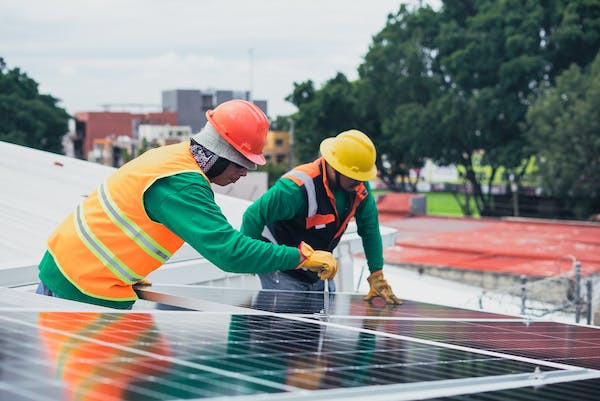Image source: Pexels
Solar PV Installation is one of the most lucrative jobs in the solar industry. The clamor for clean energy has increased the solar industry’s growth over the past decade, providing more than 150,000 jobs from the industry alone. Solar Photovoltaic (PVs) are installed to convert solar energy to electrical energy, and you can earn up to $300,000 per annum in the sector.
Solar PV is an alternative source of energy and one that is widely embraced because of its benefits. However, solar PV installers are professionals that help design, assemble and set up solar PVs. They also maintain and repair solar PVs when necessary. Solar PV installer jobs are popular now, and they pay well. For instance, the average solar PV installer job pay is around $48,000 per annum.
To enlighten you more, we have teamed up with experts in the solar industry to discuss what solar PV installer jobs are about and how to go about them. Let’s explore more.
Table Of Contents
Education And Skills Requirement For Solar PV Installer Jobs
The Solar PV installer job only requires little education as it involves more technical skills. The basic education necessary to do the job is a high school diploma. However, there are specific skills you need. Some of these skills are:
-
Great Calculation Skills
The calculation is vital in solar PV installation, as you must determine the power consumption demand before choosing a solar PV system for a building. You will know how many modules are required and how many solar PV panels you need to get the modules.
-
Ability To Work Well With Other People
Solar PV installation is not one person’s job. From design to manufacturing to installation, many professionals are needed. The number of people working on an installation process usually depends on the size of the building and the technicalities involved in the installation. Due to the necessity of many people working together, a solar PV installer must have good communication and human relations skills.
-
Calmness
Solar PV installation is electrical work. Therefore, it can be hazardous when not properly handled. Also, many solar PVs are installed on rooftops, which may be dangerous. It is, therefore, crucial for a Solar PV installer to be calm and collected, even in the face of distress. Anxiety and unrest can lead to accidents or worsen the ones already underway.
-
Design Skills and Good Interpretation of Designs
Solar PVs are designed before installation. Some companies may require their installers to design the PVs, while some may have other people for the design job. Whatever the case may be, a solar PV installer must understand designs. This will make catching up easier if you are doing the designing. If you are not doing the design, understanding designs will enable you to interpret what the designer has done perfectly.
How Much Do Solar PV Installers Earn?
The average pay for a solar PV installer in America is $47,690. However, income is not static as it depends on many things. For example, your salary may depend on your education level, experience, and position. The company you work with and the number of hours you work can also determine how much you earn.
In addition, different states pay different wages, so your income can also depend on the state you work in. These are the pay ranges for solar PV installers in some states in America:
-
Los Angeles, California
Los Angeles has Mediterranean weather, meaning they get enough sunshine. The city has about 275 sunny days a year, making it ideal for solar users. It is, therefore, no surprise that Los Angeles has the most solar users in California. The annual salary for an LA solar panel installer is between $31,000 to $42,000.
-
Austin, Texas
Despite its rapid growth across states, solar panels still do not have that great reception in Texas. With less than 3% of the population using solar energy, residential users are less than 1%, which is quite surprising as Texas gets much sun. However, the low number of users does not affect the pay of installers. The yearly income of solar PV installers in Austin, Texas, ranges from $65,000 to $98,000. The average annual salary is $80,000.
-
Phoenix, Arizona
Phoenix, Arizona, is one of the states that encourage the use of solar power. With over 8% of the city using solar to generate electricity, the solar industry has employed over 9,000 people. This is not surprising, as Arizona sees the sun all year round. The average pay for a solar PV installer is $76,500 per annum. So you can earn between $63,000 to $95,000.
-
Tampa, Florida
Florida has an encouraging number of solar users. More than 15% of the population uses solar energy, and more than 90,000 homes are solar-powered. However, Florida has enough solar panels to power over a million homes, making it ready to help its people get their buildings solar-powered. Tampa, Florida, receives about 246 sunny days a year, over 40 days more than the US average of 205 days.
Solar panel installers in this city earn between $60,000 to $91,000 per year, pegging the annual average at $74,000.
-
Denver, Colorado
Colorado ranks 14th among states that use solar panels in the US. However, the state has enough solar panels to satisfy up to 5% of its population. This makes it possible for about 300,000 homes in the state to be solar-powered. Investing over $ 3 billion in the industry, Denver, Colorado, pays solar installers between $64,000 to $97,000 per annum.
Advantages Of Solar PVs
Solar PV is used to generate energy. It converts a source of energy (the sun) to another energy source (electricity) for human use. Thus, it helps humans maximize some of what they have in abundance to get some other things they need.
Some of the benefits of solar PVs are:
-
Generate Clean Energy
The significant advantage of solar PV is the ability to generate clean energy. It is the purest energy that converts without any greenhouse emissions. Compared to fossil fuels, solar power does not harm the environment.
-
Readily Available And Abundant
Solar energy is derived from the sun, which is readily available when the weather permits. This means there cannot be scarcity as long as the weather is sunny. However, even during cold weather, the little sun that comes out can still take your solar panel a long way.
-
Save Costs
Solar energy does not use fuel or any other rechargeables. Instead, it recharges itself from the sun. This means you can easily get it for free, so far there is the sun. Therefore, it makes it cheaper to use as it does not have additional costs after installation.
-
Easily Maintained
Solar panels do not have many parts. Most importantly, it does not have major mechanical components. This means that the possibility of damage and necessary repairs is very low. Also, you do not need to clean or do anything to it after installing it, making the essential maintenance minimal to nothing.
Conclusion
Solar PVs are becoming quite popular for energy generation, making the installers highly demanded. The job pays well without excessive education and training, making it an ideal career path for people without solid academic backgrounds.


